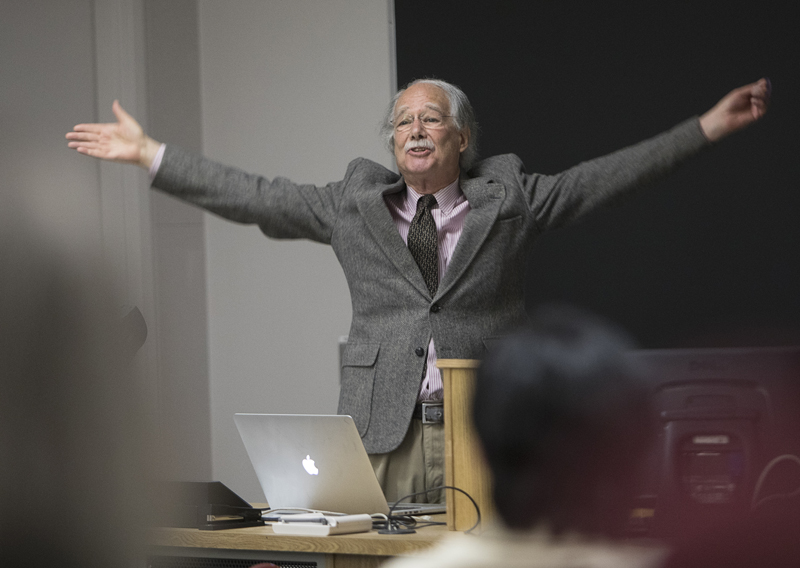Weisband returns for Homecoming
Longtime political science professor discusses new book on genocide

David Cingranelli recalled the day when he decided to sit in on a class taught by one of his mentors in the Political Science Department: Edward Weisband.
“I showed up in his office shortly before classtime,” said Cingranelli, now a professor in the department. “I was surprised to see him getting himself psyched and talking about what to say. I could tell he didn’t welcome my intrusion on his meditation!”
Cingranelli was among the former colleagues and students, along with current faculty members, to greet Weisband upon his return to Binghamton University during Homecoming on Oct. 6.
Weisband served until 1990 as a distinguished teaching professor and was recognized by the Council for the Advancement and Support of Education (CASE) as the 1987 New York State Professor of the Year. The Alumni Association also presents an annual recognition award that bears his name. He is now the Edward S. Diggs Endowed Chair Professor in the Social Sciences in the Department of Political Science at Virginia Tech.
“We were sorry when he left,” Cingranelli said. “We miss him and are delighted to have him back. When I arrived at Binghamton University 41 years ago, Edward was already one of the leading professors. He became a willing mentor, offering me a lot of advice that I took to heart.”
Weisband came to campus to discuss his latest book, The Macabresque: Human Violation and Hate in Genocide, Mass Atrocity and Enemy-Making, which will be released in November from Oxford University Press. In a talk sponsored by the Institute for Genocide and Mass Atrocity Prevention and the Political Science Department, Weisband provided an overview of his 11th book.
“The macabresque,” Weisband said, shifts the analytical perspective from collective violence, genocide and mass atrocity to human violation.
“The ultimate fight is to provide a conceptualization of what it means to be human,” he said. “What it is to understand human consciousness relative to the human unconsciousness. There is a word I use: desire. I want to take the fight to the social sciences. I want to take the fight to philosophy and argue that if you do not have a theory or a way of interpreting and theorizing desire, go back to the drawing board.”
Even though Weisband’s classes often filled Lecture Hall 1, Cingranelli said the influence and impact went beyond the classroom.
“I can honestly say that the students loved him,” Cingranelli said. “They were inspired. They would come for office hours and they would come to his office even if he didn’t have office hours! They would wait for long periods of time for a chance to speak with him.”
One inspired Binghamton student was Owen Pell ’80, now a partner with White & Case and a board member for the Auschwitz Institute for Peace and Reconciliation.
“Professor Weisband defined my college experience,” Pell told the audience. “He taught me so many things you don’t learn in the classroom. His intellectual energy and willingness to look beyond his field was comforting to someone like me who had a lot of interests.
“I didn’t realize at the time how much Professor Weisband had set me on my journey,” he added. “They are few weeks that go by that I don’t think about the things we did together – helping him write a textbook outline after I graduated or going to his home and talking about what we learned.”
Pell said he was so desperate to meet Weisband as a freshman that he chose to break a world-politics simulation game during a class with the professor.
“I did destroy the game,” Pell recalled. “It ruined the evening (class). He was very angry. He said: ‘Who was the idiot who did this?’ My TA – Kent Trachte, who is now president of Lycoming College – pointed at me. I looked at Professor Weisband and said: ‘I can build you a better game.’”
Pell went on to become Weisband’s teaching assistant for the next three years.
Weisband’s book shows “the need and role of the university in genocide prevention,” Pell said.
“Genocide goes to the essence of the human experience,” Pell said. “There is no getting around it. It is obvious that a university is the place that must engage with these issues. It is only at a university where you engage the full dimension of the human experience.”
Weisband praised the University’s new Institute for Genocide and Mass Atrocity Prevention and also paid tribute to many of his former political science colleagues, including Cingranelli.
“David’s name and influence is extraordinary,” he said. “There are (those) who use the Cingranelli model and do it with tremendous value to the cause of examining, understanding and analyzing international human rights. David is a terribly kind person and his contributions are transcendental.”
Weisband also displayed his sense of humor when he discussed leading the Political Science Department.
“I was chair of this department for one term – three years. Dave Clark informed me he has done three terms. Let the guy off the hook!” he said to laughter. “After one term, I vowed that if it was possible for me to live this life and have a career without ever going into academic administration, so help me I would do it.”
Several former Binghamton students, including Pell, are acknowledged in The Macabresque, Weisband said.
“How I cherish the memories,” he said. “It is so sentimental to be home.”

